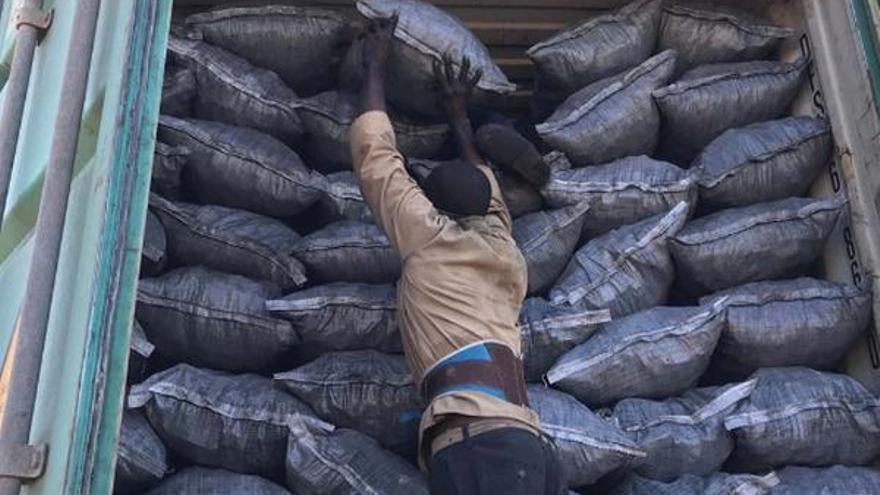
![]() 14ymedio, Mercedes García, Sancti Spíritus , 23 February 2022 — A report published by 14ymedio last January has led the military authorities of Sancti Spíritus to review the working conditions of dozens of prisoners who make and carry marabou charcoal. The inmates work for the state-owned Various Production Company (Provari), which does not pay them a penny, but has agreed to grant them certain “incentives.”
14ymedio, Mercedes García, Sancti Spíritus , 23 February 2022 — A report published by 14ymedio last January has led the military authorities of Sancti Spíritus to review the working conditions of dozens of prisoners who make and carry marabou charcoal. The inmates work for the state-owned Various Production Company (Provari), which does not pay them a penny, but has agreed to grant them certain “incentives.”
“It caused a tremendous fuss after the article came out and now for every ton of coal we process he gives us a day pass, before we didn’t even get that,” one of the prisoners tells this newspaper. The number of workers dedicated to this task has been drastically reduced as well. “Out of about forty of us who were almost forced to do this, now we have ten left.”
“Only those who have been in prison for more than ten years are coming and this work can influence some reduction in their sentence,” he explains. “They are no longer using the youngest for this, those whose souls were broken here on the sacks, nor those who have sentences of a few years.”
“The few who are coming are those who are in jail for murder, cattle slaughter and other crimes that carry a longer sentence,” explains the man, who is serving a sentence for being part of a gang that killed cows. “The others said that if the work was part of the re-education and they weren’t going to pay, then they couldn’t force them, and since now all eyes are on here, they have been able to stay on the farm.”
These inmates belong to the Banao 6 work farm, officially known as the Union Reeducation Center and which is located in the infrastructure of an old pre-university school that, after no longer receiving students, has rapidly deteriorated due to lack of maintenance and the vandalism.
“A few days ago they did an internal reorganization. Before, they came to the farm with a cart and filled it with prisoners who had to go to work on the charcoal, no matter what. Now they are not doing it like that anymore,” the source details. “But they still don’t pay us, we haven’t seen a penny of all this hard work yet but at least we get some encouragement from going home and being with family.”
The areas where the charcoal is processed are located in the vicinity of Banao 6 and is handled by Provari, a company of the Ministry of the Interior, whose director is Lieutenant Colonel Juan Luis Baffil Rodríguez who has been involved in previous complaints of exploiting the labor of inmates.
Last January, several testimonies compiled by this newspaper reported that, despite producing export merchandise, the inmates did not receive any salary for their hard work. The protective equipment they had was little or none and the prisoners could not refuse to do this work under penalty of reprisals or not having access to reductions in their sentences.
With the new modifications, “Provari is experiencing losses,” acknowledges an employee of the company from the Ministry of the Interior. “They have taken away a lot of our workforce and we can no longer have the same number of people because now we have to count on their will to go out to this work, and many people do not want to do it even if they are paid a lot of money.”
“We are going to use force so that we can have all those men in the marabou again, but we will have to wait because the instructions to do so came from Havana,” warns the Provari worker. “We had to sit down with the prisoners and explain to them that it was going to be voluntary and of course, right there they took hold of it and now they don’t want to work in the charcoal.”
The inmates not only carry sacks but also work in the preparation of the ovens, the sifting of charcoal and the composition of the bags. They do not have specialized masks to protect themselves, nor back braces, gloves, boots or adequate clothing. They even made the coal sifter themselves with pieces of metal and wood.
Banao 6 prisoners produce up to four containers of marabou charcoal per month, with a minimum of 18.5 tons each. The product is highly valued in the international market because it burns slowly and evenly, in addition to imbuing food with a special flavor.
In Europe, Cuban charcoal is sold for 400 euros a ton and its export grows year after year. In 2013, the Island sold 70,200 tons to Germany, Belgium, Canada, Spain, France, Greece, Italy, Israel, Portugal and Turkey. After reaching 130,000 tons in 2018, exports recorded lower data from 2020 due to the effects of the covid pandemic.
____________
COLLABORATE WITH OUR WORK: The 14ymedio team is committed to practicing serious journalism that reflects Cuba’s reality in all its depth. Thank you for joining us on this long journey. We invite you to continue supporting us by becoming a member of 14ymedio now. Together we can continue transforming journalism in Cuba.
